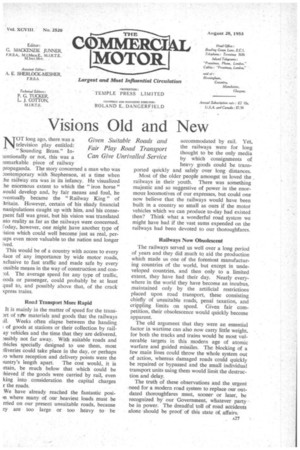Visions Old and New
Page 29

If you've noticed an error in this article please click here to report it so we can fix it.
NOT long ago, there was a television play entitled: "Sounding Brass." Intentionally or not, this was a remarkable piece of railway propaganda. The story concerned a man who was :.onternporary with Stephenson, at a time when .he railway era Was in its infancy. He visualized he enormous extent to which the "iron horse" mould develop and, by fair means and foul, he ;ventually became the "Railway King" of 3ritain. However, certain of his shady financial nanipulations caught up with him, and his consejuent fall was great, but his vision was translated nto reality as far as the railways were concerned. roday, however, one might have another type of ision which could well become just as real, pertaps even more valuable to the nation and longer ived.
This would be of a country with access to every lace of any importance by wide motor roads, xclusive to fast traffic and made safe by every ossible means in the way of construction and conThe. average speed for any type of traffic, oods or passenger, could probably be at least qual to, and possibly above that, of the crack Kpress trains.
Road Transport More Rapid It is mainly in the matter of speed for the transmt of rex materials and goods that the railways Weeks often elapse between the handing of goods at stations or their collection by railay vehicles and the time that they are delivered, )ssibly not far away. With suitable roads and ;hides specially designed to use them, most liveries could take place in the day, or perhaps To where reception and delivery points were the mntry's length apart. The cost would, it is Ttain, be much below that which could be thieved if the goods were carried by rail, even king into consideration the capital charges r the roads.
We have already reached the fantastic posiIn where many of our heaviest loads must be rried on our present unsuitable roads, because :3/ are too large or too heavy to be accommodated by rail. Yet, the railways were for long thought to be the only media by which consignments of heavy goods could be transported quickly and safely over long distances.
Most of the older people amongst us loved the railways in their youth. There was something majestic and so suggestive of power in the enormous locomotives of our expresses, but could one now believe that the railways would have been built in a country so small as ours if the motor vehicles which we can produce to-day had existed then'? Think what a wonderful road system we might have had if the vast sums expended on the railways had been devoted to our thoroughfares.
Railways Now Obsolescent The railways served us well over a long period of years and they did much to aid the production which made us one of the foremost manufacturing countries of the world, but except in undeveloped countries, and then only to a limited extent, they have had their day. Nearly everywhere in the world they have become an incubus, maintained only by the artificial restrictions placed upon road transport, these consisting chiefly of unsuitable roads, penal taxation, and crippling limits on speed. Given fair competition, their obsolescence would quickly become apparent.
The old argument that they were an essential factor in wartime can also now carry little weight, for both the tracks and trains would be most vul. nerable targets in this modern age of atomic warfare and guided missiles. The blocking of a few main lines could throw the whole system out of action, whereas damaged roads could quickly be repaired or bypassed and the small individual transport units using them would limit the destruction and delay.
The truth of these observations and the urgent need for a modern road system to replace our outdated thoroughfares must, sooner or later, be recognized by our Government, whatever party be in power. The dreadful toll of road accidents alone should be proof of this state of, affairs.




















































































